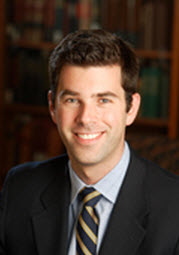SC CTSI KL2 Scholar Investigates Inflammation In Search Of New Treatments for Stroke Patients
USC's William Mack credits SC CTSI with helping him become an independent clinical researcher.
Nearly 800,000 Americans suffer stroke each year, and 130,000 die annually of the attacks that shut down normal blood flow to parts of the brain, statistics that make stroke a leading cause of death and serious disability.
As a result, treatments that can minimize damage are crucial to the survival and long-term health of stroke patients, explained William J. Mack, MD, assistant professor in the Department of Neurological Surgery at USC, and director of the Cerebrovascular Laboratory at the Zilkha Neurogenetic Institute, both within USC's Keck School of Medicine.

William J. Mack, MD
While a scholar in the KL2 Scholar program, offered through the Southern California Clinical and Translational Science Institute (SC CTSI), Mack investigated how doctors could manipulate the body's natural inflammation response to treat stroke and other blood flow disorders of the brain.
"Without a program like this that supports the mentors and organizes the coursework and seminars, there's no guarantee you'll get the best coaching and training for your research goals," Mack said.
About 85% of strokes are ischemic, caused by clots or plaque that block blood vessels in the brain. Within minutes of the loss of blood supply, brains cells in the affected areas die. The physical and mental functions those brain cells control are also lost, causing numerous disabilities, such as movement disorders and problems with speech and memory. About two-thirds of stroke patients suffer some disability.
Mack and his team used a mouse model to study a portion of the inflammation response called the C5 complement component. They found that by inhibiting the C5 receptors – and thus reducing inflammation – they could reduce the neurological damage after a stroke.
In search of therapies to minimize disability from strokes
Mack's research also focused on a lesser-known and frequently undiagnosed disorder of brain circulation called cerebral hypoperfusion, a condition of chronic low blood flow due to narrowing of cerebral arteries. As in stroke, the reduced blood flow of cerebral hypoperfusion can impair brain function and cause mental deficits.
These deficits, though often subtle, occur in areas such as memory and executive functioning, a class of thought processes used for tasks like balancing checkbooks and other procedural thinking.
"People with cerebral hypoperfusion usually look completely normal, and any signs of a problem often get neglected in a gross examination by a doctor," said Mack. "But any loss of normal blood circulation in the brain needs to be addressed to minimize the damage."
In popular articles about health, inflammation is often implicated in a wide range of health problems. But, explained Mack, the reality is far more complex. "Inflammation can be good or bad, depending on the situation," said Mack. "Sometimes it's necessary. You wouldn't want to block all inflammation that occurs in the body."
The next step for the C5 research, said Mack, is to find the proper chemical or drug to block inflammation in order to treat both stroke patients and those suffering cerebral hypoperfusion.
Learning to think like a researcher
Mack was one of the first of USC's physician-scientists to complete SC CTSI’s KL2 researcher education program. He credits the program with helping him speed his own development into an independent clinical researcher.
"The program put me in a position to advance my research career much more quickly," said Mack. "Structured teaching like the KL2 program creates a formal pathway for more experienced researchers to guide newer researchers."
For Mack, this meant the KL2-supported mentorship from a cross-disciplinary team that helped him shape his research. This team included USC gerontologist Caleb Finch, PhD; Berislav V. Zlokovic, MD, PhD, chair of the Department of Physiology and Biophysics, and director of the Zilkha Neurogenetic Institute; and professor of neurology Helena Chui, MD, chair of the Department of Neurology at Keck School of Medicine of USC.
Since KL2 scholars come from different disciplines, they have different educational needs and gain different benefits from the program's spectrum of courses and coaching. Mack, for example, delved heavily into courses on biomedical research design and statistics.
"The mentors in SC CTSI and the KL2 program taught me how to think like a researcher," said Mack. "This training affected the shape of my research in fundamental ways – they improved my skills in things like hypothesis generation, research design, and my formal knowledge of statistics and analysis of findings."
The benefits have been concrete, said Mack. Since starting the KL2 scholar program, he has been awarded three grants for research and generated 20 publications.
"Without a program like this that supports the mentors and organizes the coursework and seminars, there's no guarantee you'll get the best coaching and training for your research goals," Mack said.
SC CTSI is part of the 62-member Clinical and Translational Science Awards (CTSA) network funded through the National Center for Advancing Translational Sciences (NCATS) at the NIH (Grant Number UL1TR000130). Under the mandate of “Translating Science into Solutions for Better Health,” SC CTSI provides a wide range of resources, services, funding, and education for researchers and promotes online collaboration tools such as USC Profiles.



